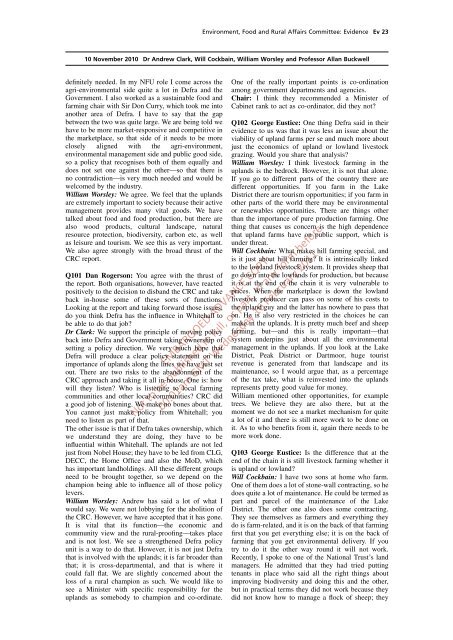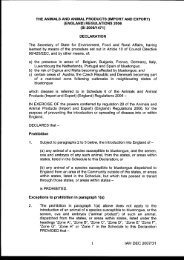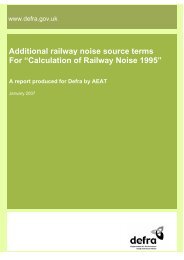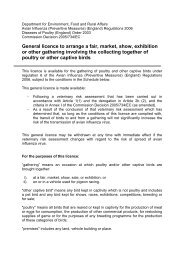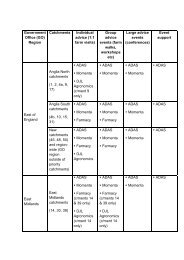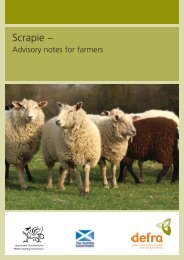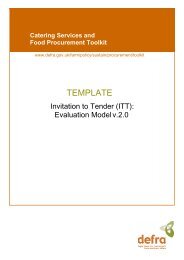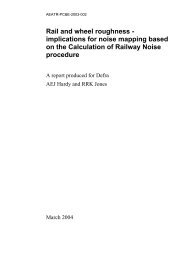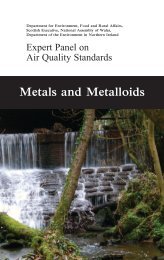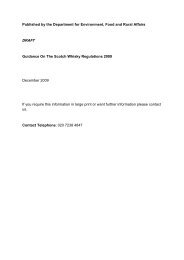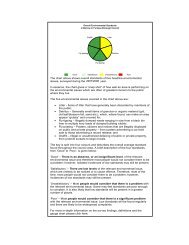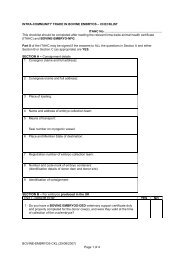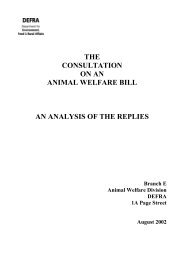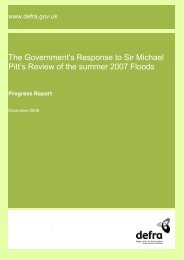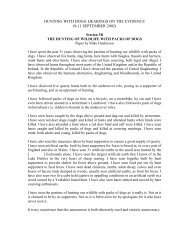Farming in the Uplands - ARCHIVE: Defra
Farming in the Uplands - ARCHIVE: Defra
Farming in the Uplands - ARCHIVE: Defra
You also want an ePaper? Increase the reach of your titles
YUMPU automatically turns print PDFs into web optimized ePapers that Google loves.
Environment, Food and Rural Affairs Committee: Evidence Ev 23<br />
10 November 2010 Dr Andrew Clark, Will Cockba<strong>in</strong>, William Worsley and Professor Allan Buckwell<br />
def<strong>in</strong>itely needed. In my NFU role I come across <strong>the</strong><br />
agri-environmental side quite a lot <strong>in</strong> <strong>Defra</strong> and <strong>the</strong><br />
Government. I also worked as a susta<strong>in</strong>able food and<br />
farm<strong>in</strong>g chair with Sir Don Curry, which took me <strong>in</strong>to<br />
ano<strong>the</strong>r area of <strong>Defra</strong>. I have to say that <strong>the</strong> gap<br />
between <strong>the</strong> two was quite large. We are be<strong>in</strong>g told we<br />
have to be more market-responsive and competitive <strong>in</strong><br />
<strong>the</strong> marketplace, so that side of it needs to be more<br />
closely aligned with <strong>the</strong> agri-environment,<br />
environmental management side and public good side,<br />
so a policy that recognises both of <strong>the</strong>m equally and<br />
does not set one aga<strong>in</strong>st <strong>the</strong> o<strong>the</strong>r—so that <strong>the</strong>re is<br />
no contradiction—is very much needed and would be<br />
welcomed by <strong>the</strong> <strong>in</strong>dustry.<br />
William Worsley: We agree. We feel that <strong>the</strong> uplands<br />
are extremely important to society because <strong>the</strong>ir active<br />
management provides many vital goods. We have<br />
talked about food and food production, but <strong>the</strong>re are<br />
also wood products, cultural landscape, natural<br />
resource protection, biodiversity, carbon etc, as well<br />
as leisure and tourism. We see this as very important.<br />
We also agree strongly with <strong>the</strong> broad thrust of <strong>the</strong><br />
CRC report.<br />
Q101 Dan Rogerson: You agree with <strong>the</strong> thrust of<br />
<strong>the</strong> report. Both organisations, however, have reacted<br />
positively to <strong>the</strong> decision to disband <strong>the</strong> CRC and take<br />
back <strong>in</strong>-house some of <strong>the</strong>se sorts of functions.<br />
Look<strong>in</strong>g at <strong>the</strong> report and tak<strong>in</strong>g forward those issues,<br />
do you th<strong>in</strong>k <strong>Defra</strong> has <strong>the</strong> <strong>in</strong>fluence <strong>in</strong> Whitehall to<br />
be able to do that job?<br />
Dr Clark: We support <strong>the</strong> pr<strong>in</strong>ciple of mov<strong>in</strong>g policy<br />
back <strong>in</strong>to <strong>Defra</strong> and Government tak<strong>in</strong>g ownership of<br />
sett<strong>in</strong>g a policy direction. We very much hope that<br />
<strong>Defra</strong> will produce a clear policy statement on <strong>the</strong><br />
importance of uplands along <strong>the</strong> l<strong>in</strong>es we have just set<br />
out. There are two risks to <strong>the</strong> abandonment of <strong>the</strong><br />
CRC approach and tak<strong>in</strong>g it all <strong>in</strong>-house. One is: how<br />
will <strong>the</strong>y listen? Who is listen<strong>in</strong>g to local farm<strong>in</strong>g<br />
communities and o<strong>the</strong>r local communities? CRC did<br />
a good job of listen<strong>in</strong>g. We make no bones about that.<br />
You cannot just make policy from Whitehall; you<br />
need to listen as part of that.<br />
The o<strong>the</strong>r issue is that if <strong>Defra</strong> takes ownership, which<br />
we understand <strong>the</strong>y are do<strong>in</strong>g, <strong>the</strong>y have to be<br />
<strong>in</strong>fluential with<strong>in</strong> Whitehall. The uplands are not led<br />
just from Nobel House; <strong>the</strong>y have to be led from CLG,<br />
DECC, <strong>the</strong> Home Office and also <strong>the</strong> MoD, which<br />
has important landhold<strong>in</strong>gs. All <strong>the</strong>se different groups<br />
need to be brought toge<strong>the</strong>r, so we depend on <strong>the</strong><br />
champion be<strong>in</strong>g able to <strong>in</strong>fluence all of those policy<br />
levers.<br />
William Worsley: Andrew has said a lot of what I<br />
would say. We were not lobby<strong>in</strong>g for <strong>the</strong> abolition of<br />
<strong>the</strong> CRC. However, we have accepted that it has gone.<br />
It is vital that its function—<strong>the</strong> economic and<br />
community view and <strong>the</strong> rural-proof<strong>in</strong>g—takes place<br />
and is not lost. We see a streng<strong>the</strong>ned <strong>Defra</strong> policy<br />
unit is a way to do that. However, it is not just <strong>Defra</strong><br />
that is <strong>in</strong>volved with <strong>the</strong> uplands; it is far broader than<br />
that; it is cross-departmental, and that is where it<br />
could fall flat. We are slightly concerned about <strong>the</strong><br />
loss of a rural champion as such. We would like to<br />
see a M<strong>in</strong>ister with specific responsibility for <strong>the</strong><br />
uplands as somebody to champion and co-ord<strong>in</strong>ate.<br />
One of <strong>the</strong> really important po<strong>in</strong>ts is co-ord<strong>in</strong>ation<br />
among government departments and agencies.<br />
Chair: I th<strong>in</strong>k <strong>the</strong>y recommended a M<strong>in</strong>ister of<br />
Cab<strong>in</strong>et rank to act as co-ord<strong>in</strong>ator, did <strong>the</strong>y not?<br />
Q102 George Eustice: One th<strong>in</strong>g <strong>Defra</strong> said <strong>in</strong> <strong>the</strong>ir<br />
evidence to us was that it was less an issue about <strong>the</strong><br />
viability of upland farms per se and much more about<br />
just <strong>the</strong> economics of upland or lowland livestock<br />
graz<strong>in</strong>g. Would you share that analysis?<br />
William Worsley: I th<strong>in</strong>k livestock farm<strong>in</strong>g <strong>in</strong> <strong>the</strong><br />
uplands is <strong>the</strong> bedrock. However, it is not that alone.<br />
If you go to different parts of <strong>the</strong> country <strong>the</strong>re are<br />
different opportunities. If you farm <strong>in</strong> <strong>the</strong> Lake<br />
District <strong>the</strong>re are tourism opportunities; if you farm <strong>in</strong><br />
o<strong>the</strong>r parts of <strong>the</strong> world <strong>the</strong>re may be environmental<br />
or renewables opportunities. There are th<strong>in</strong>gs o<strong>the</strong>r<br />
than <strong>the</strong> importance of pure production farm<strong>in</strong>g. One<br />
th<strong>in</strong>g that causes us concern is <strong>the</strong> high dependence<br />
that upland farms have on public support, which is<br />
under threat.<br />
Will Cockba<strong>in</strong>: What makes hill farm<strong>in</strong>g special, and<br />
is it just about hill farm<strong>in</strong>g? It is <strong>in</strong>tr<strong>in</strong>sically l<strong>in</strong>ked<br />
to <strong>the</strong> lowland livestock system. It provides sheep that<br />
go down <strong>in</strong>to <strong>the</strong> lowlands for production, but because<br />
it is at <strong>the</strong> end of <strong>the</strong> cha<strong>in</strong> it is very vulnerable to<br />
prices. When <strong>the</strong> marketplace is down <strong>the</strong> lowland<br />
livestock producer can pass on some of his costs to<br />
<strong>the</strong> upland guy and <strong>the</strong> latter has nowhere to pass that<br />
on. He is also very restricted <strong>in</strong> <strong>the</strong> choices he can<br />
make <strong>in</strong> <strong>the</strong> uplands. It is pretty much beef and sheep<br />
farm<strong>in</strong>g, but—and this is really important—that<br />
system underp<strong>in</strong>s just about all <strong>the</strong> environmental<br />
management <strong>in</strong> <strong>the</strong> uplands. If you look at <strong>the</strong> Lake<br />
District, Peak District or Dartmoor, huge tourist<br />
revenue is generated from that landscape and its<br />
ma<strong>in</strong>tenance, so I would argue that, as a percentage<br />
of <strong>the</strong> tax take, what is re<strong>in</strong>vested <strong>in</strong>to <strong>the</strong> uplands<br />
represents pretty good value for money.<br />
William mentioned o<strong>the</strong>r opportunities, for example<br />
trees. We believe <strong>the</strong>y are also <strong>the</strong>re, but at <strong>the</strong><br />
moment we do not see a market mechanism for quite<br />
a lot of it and <strong>the</strong>re is still more work to be done on<br />
it. As to who benefits from it, aga<strong>in</strong> <strong>the</strong>re needs to be<br />
more work done.<br />
EMBARGOED ADVANCE COPY:<br />
Not to be published <strong>in</strong> full, or part, <strong>in</strong> any form before<br />
00.01am GMT Wednesday 16 February 2011<br />
Q103 George Eustice: Is <strong>the</strong> difference that at <strong>the</strong><br />
end of <strong>the</strong> cha<strong>in</strong> it is still livestock farm<strong>in</strong>g whe<strong>the</strong>r it<br />
is upland or lowland?<br />
Will Cockba<strong>in</strong>: I have two sons at home who farm.<br />
One of <strong>the</strong>m does a lot of stone-wall contract<strong>in</strong>g, so he<br />
does quite a lot of ma<strong>in</strong>tenance. He could be termed as<br />
part and parcel of <strong>the</strong> ma<strong>in</strong>tenance of <strong>the</strong> Lake<br />
District. The o<strong>the</strong>r one also does some contract<strong>in</strong>g.<br />
They see <strong>the</strong>mselves as farmers and everyth<strong>in</strong>g <strong>the</strong>y<br />
do is farm-related, and it is on <strong>the</strong> back of that farm<strong>in</strong>g<br />
first that you get everyth<strong>in</strong>g else; it is on <strong>the</strong> back of<br />
farm<strong>in</strong>g that you get environmental delivery. If you<br />
try to do it <strong>the</strong> o<strong>the</strong>r way round it will not work.<br />
Recently, I spoke to one of <strong>the</strong> National Trust’s land<br />
managers. He admitted that <strong>the</strong>y had tried putt<strong>in</strong>g<br />
tenants <strong>in</strong> place who said all <strong>the</strong> right th<strong>in</strong>gs about<br />
improv<strong>in</strong>g biodiversity and do<strong>in</strong>g this and <strong>the</strong> o<strong>the</strong>r,<br />
but <strong>in</strong> practical terms <strong>the</strong>y did not work because <strong>the</strong>y<br />
did not know how to manage a flock of sheep; <strong>the</strong>y


